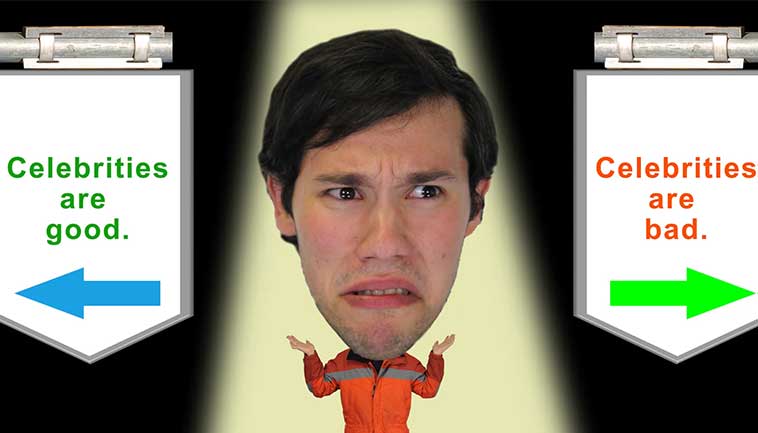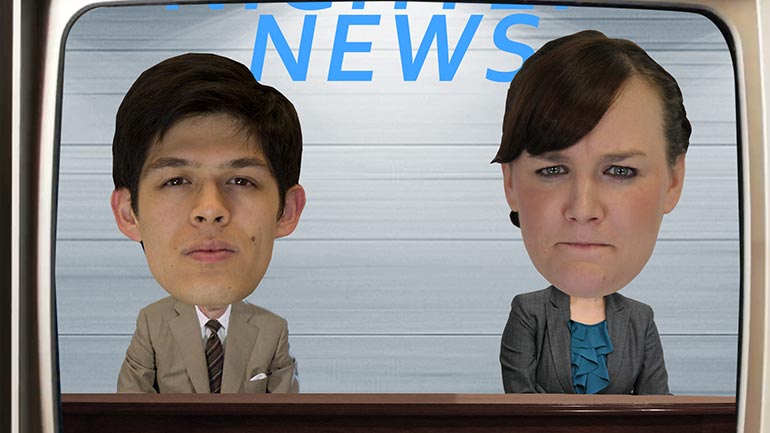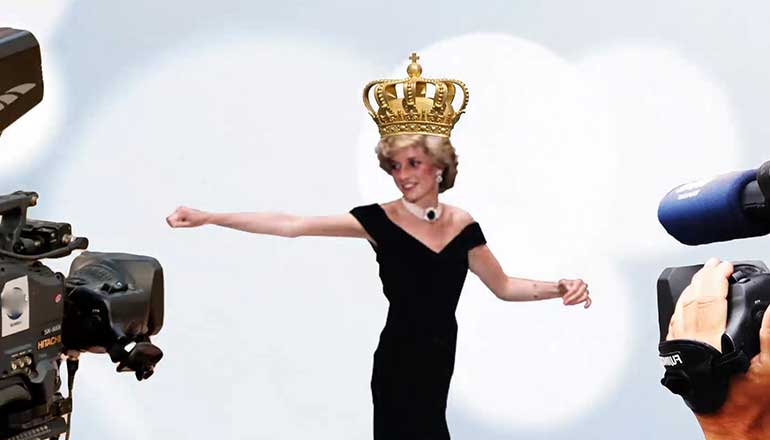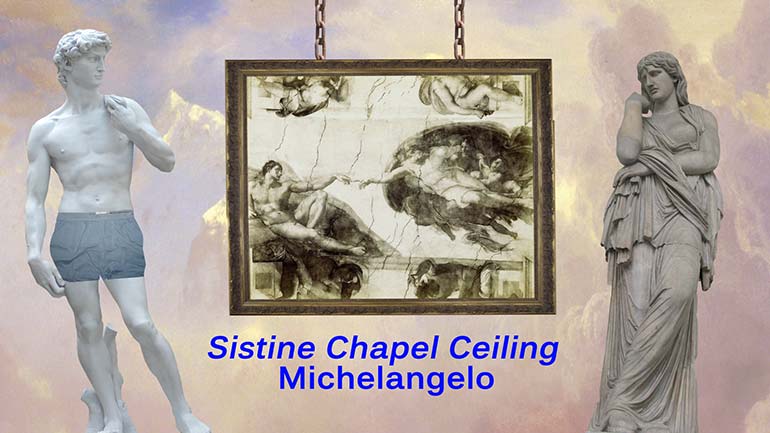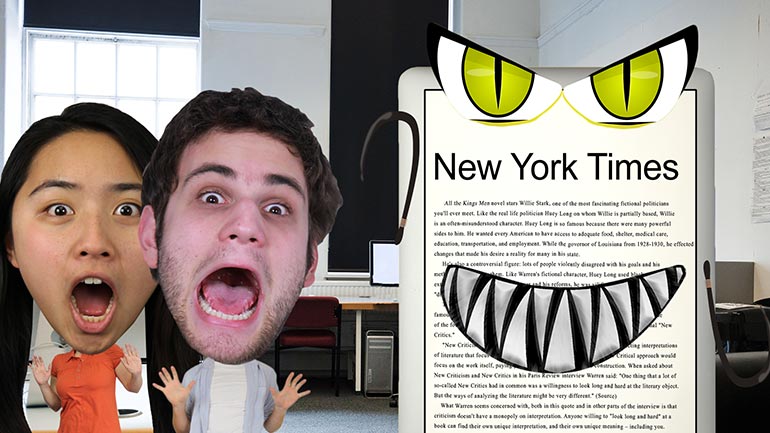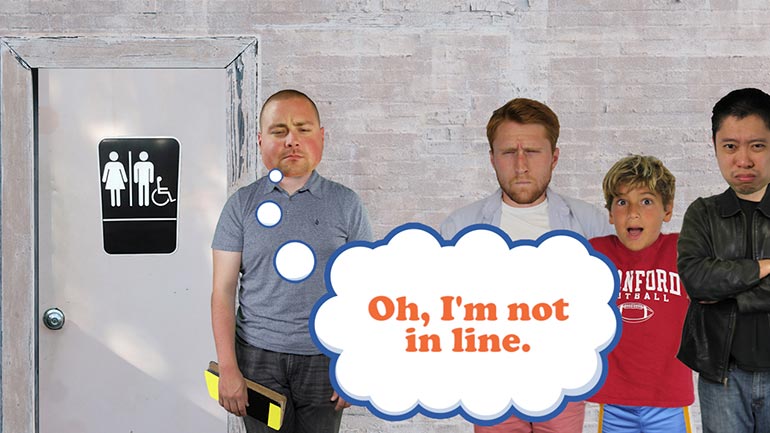ShmoopTube
Where Monty Python meets your 10th grade teacher.
Search Thousands of Shmoop Videos
Web Literacy: Tone 3634 Views
Share It!
Transcript
- 00:01
We speak student!
- 00:06
Power in Literature
- 00:07
Web Literacy
- 00:09
Tone
- 00:10
[ dog barks ]
Full Transcript
- 00:11
What does tone convey in writing?
- 00:14
Tone is just the author's attitude toward whatever they're writing.
- 00:17
Plain and simple.
- 00:19
One really important thing is to not confuse tone and style.
- 00:23
Tone and writing style are two different things.
- 00:24
People confuse them all the time.
- 00:26
If you go to any of our Shmoop guides,
- 00:27
you'll see a section on tone and a section on style.
- 00:29
So that can help you figure that out.
- 00:31
Writing style is like getting into the nitty-gritty.
- 00:35
"Short sentences" or "Doesn't use punctuation."
- 00:39
Or you might call someone Hemingway-esque.
- 00:42
That's because of the writing style -
- 00:43
short sentences, very simple.
- 00:44
The tone is the author's attitude toward what they're writing.
- 00:48
So that would be, "The author's writing is ironic"
- 00:53
or "It's cynical" or whatever the case is.
- 00:56
Some examples:
- 00:57
Nick Carraway, probably the most famous narrator
- 01:00
in all of literature --
- 01:02
all of American literature.
- 01:03
This is a cynical narrator.
- 01:05
And sometimes the author's attitude toward the text
- 01:10
comes through the narrator in this case.
- 01:12
Other times it's the author themselves
- 01:15
when there's a third person omniscient narrator.
- 01:19
But Nick Carraway is a cynical narrator.
- 01:21
He is saying what he thinks,
- 01:24
and he doesn't like what he sees.
- 01:25
He'll say things like,
- 01:26
"Oh, I felt like I was talking to a child."
- 01:28
Or, "These people -- They're idiots, basically."
- 01:32
He's looking at what's happening
- 01:34
around him and judging it.
- 01:35
And so while Fitzgerald's style may be one way or another,
- 01:40
and while he may use insanely big words --
- 01:44
these like five-dollar words and we don't understand any of it,
- 01:45
that's the writing style.
- 01:47
The tone is cynical.
- 01:48
The tone is how Nick Carraway,
- 01:50
and thus Fitzgerald,
- 01:52
feels about what is happening in the plot.
- 01:55
Then we compare that to
- 01:57
something like Orwell.
- 01:59
Like Animal Farm.
- 02:00
So George Orwell was an essayist.
- 02:02
So his tone is a lot more removed. We'd call that objective.
- 02:06
He writes, you know, reading Animal Farm,
- 02:09
and he'll just be like,
- 02:10
"The pigs tore each other to shreds."
- 02:12
Like no judgment.
- 02:15
There's no, "And that was bad." or "And that was good."
- 02:18
Right, so it's a journalist.
- 02:19
It's actively neutral.
- 02:21
Exactly, exactly.
- 02:22
And that brings up kind of a big issue with tone.
- 02:25
What tone allows us to see
- 02:27
is whether a text is subjective or objective.
- 02:30
We're talking about literature here,
- 02:31
but for what pertains to this course,
- 02:33
and we're talking about web literacy.
- 02:35
This is how you can tell
- 02:36
if a source on the Internet is objective or subjective.
- 02:40
Objective means it's just the facts.
- 02:42
The author's opinion and attitude is not in there.
- 02:46
And I can argue, though, how could it not be?
- 02:49
In that that's a conscious decision.
- 02:51
And by making it appear as if it's just the facts,
- 02:54
you get this journalistic --
- 02:55
Or what journalism used to be 50 years ago.
- 02:57
You get this journalistic credibility
- 02:59
- that it's actually honest and it's not politically biased - Yeah.
- 03:02
- and so on. - Yeah, you're one step ahead of me.
- 03:03
That's exactly right.
- 03:04
So even -- We go back to Orwell.
- 03:06
Clearly Orwell was trying to make a point with Animal Farm.
- 03:09
He was not objective.
- 03:11
But when you write in a way that makes it seem like you're objective,
- 03:15
you sound more credible.
- 03:16
That's why it's very dangerous,
- 03:17
especially with sources on the web,
- 03:19
to just say, like you said, "It's a journal article.
- 03:22
It's from the New York Times or it's from whatever it's from.
- 03:26
Oh, yeah, it's news."
- 03:28
No. You have to look at a lot of different issues,
- 03:30
which we'll get to.
- 03:32
But the first step in figuring out
- 03:35
if you can trust a source on the Internet
- 03:38
is to decide
- 03:39
are we leaning toward objective
- 03:40
or are we leaning toward subjective?
- 03:42
Some pieces, as you mentioned,
- 03:44
are written, "Oh this is totally objective."
- 03:47
whether or not it is.
- 03:48
Others are written with no pretense of being objective.
- 03:51
An opinion piece in a newspaper.
- 03:54
And you know right then and there,
- 03:55
"Okay, this is gonna be subjective."
- 03:57
And knowing whether something is objective or subjective
- 03:59
changes a ton about how you read it.
- 04:01
But again, that all brings us back to tone.
- 04:03
What is the author's attitude toward a text?
- 04:05
When an author's attitude is absent,
- 04:07
it is objective.
- 04:09
When an author's attitude is fully there,
- 04:11
it is subjective. And there's a range.
- 04:12
But figuring out what that tone is
- 04:14
is gonna really help you determine the credibility of a source.
- 04:17
Understood. And some of the clues I know that I think about
- 04:19
when I read writers.
- 04:21
Often it's the sources they cite.
- 04:24
And then that gives deep clarity
- 04:25
for what the author believes.
- 04:27
Definitely. Sources are a huge way
- 04:29
to tell what an author's tone is.
- 04:32
Really the main way you determine tone,
- 04:34
whether it's in literature or in an online article,
- 04:37
is through the word choice.
- 04:38
You can think of it really simply --
- 04:39
I think the example we give in our literature glossary online
- 04:42
is if you're saying, "Dave creeped across the room
- 04:46
and moved gently toward his office."
- 04:49
We get like, "Okay, something's going on here.
- 04:52
What's happening?"
- 04:53
Versus "Dave walked to his office."
- 04:56
We're saying the same exact thing,
- 04:58
but we're using different words.
- 05:00
So word choice, which we call diction, really affects
- 05:04
the tone of the piece.
- 05:06
All right, two words: words matter.
- 05:08
Tone.
- 05:10
[ pen writing ]
- 05:13
What is tone?
- 05:14
What is writing style?
- 05:17
How does the tone help you understand a source's credibility?
- 05:22
What is objective/subjective writing?
- 05:30
[ sings note ]
- 05:32
Yeah, it's not that.
Related Videos
What's the difference between a real estate agent and a real estate broker? Is the latter just, uh... out of cash? Quite the opposite, in fact. Jum...
So... what's a TSA worker, and what do they do? Oh, we thought maybe you knew. Okay, okay... so TSA (or Transportation Security Administration) wor...
